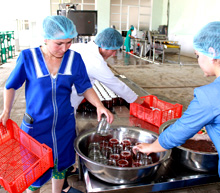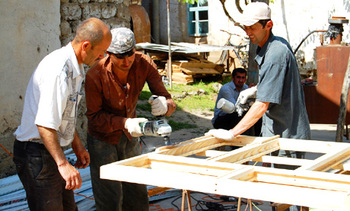Framework and Finance for Private Sector Development (FFPSD)
Project description
Title: Framework and Finance for Private Sector Development in Tajikistan
Commissioned by: German Federal Ministry for Economic Cooperation and Development (BMZ)
Country: Tajikistan
Lead executing agency: Ministry of Economic Development and Trade of the Republic of Tajikistan
Overall term: 2011 to 2016

Context
Since its independence in 1991, Tajikistan has undergone the transition from a centrally planned to a market economy. Despite the reforms, the private sector still faces diverse challenges. In the dialogue with the government, private enterprises do not present a common front. They have to cope with interference from the central administration, limited access to international markets, high capital costs and obsolete technology. The poor infrastructure and business environment compound the situation.
Objective
Conditions have improved for sustainable and broad-based growth in the Tajik economy, especially in rural areas.
Approach
GIZ is supporting the government and the private sector in Tajikistan in raising economic growth in rural areas and developing sustainable and profitable businesses. The project’s activities focus on strengthening value chains for the production of agricultural and non-agricultural products. With support from a consulting consortium led by AFC, GIZ is facilitating the introduction of a low-cost private agricultural extension service to provide farmers with information on locally appropriate crop cultivation methods, and supporting capacity development activities for farmers’ associations and enterprises.
The project also promotes cross-border dialogue between local authorities, entrepreneurs and traders on each side of Tajikistan’s borders with Afghanistan and Kyrgyzstan.
An efficient financial system contributes to a conducive investment and business climate. With support from a consulting consortium led by AFC from March 2013 to September 2016, GIZ is advising microfinance institutions on how to use flexible credit lines and new financial products, for instance in the areas of agriculture and energy efficiency, to improve their client focus.
Finally, the project is supporting ministries and institutions in improving the analytical foundation of their policy decision-making.
The programme is co-financed by the UK’s Department for International Development (DFID).
Results
As a result of the dialogue process involving representatives of public and private sectors and civil society, numerous national and local regulations have been adjusted in order to improve the business environment. For example, the number of permits necessary to launch a business start-up has been reduced from several hundred to fewer than 80.
GIZ has developed a low-cost, private advisory service to help increase the productivity of plant cultivation. Farmers benefiting from this on more than 30,000 hectares of land generally achieve up to 25 per cent higher yields. Other value chains developed with project support include the production and marketing of jewellery using semi-precious stones from the Pamir Mountains, and the manufacture of high-quality leather.
Banks and microfinance institutions have developed loan and savings products adapted to the specific needs of farmers, craftspeople and households, as well as for business start-ups. Over 12,000 new clients, almost half of them women, now use of these services.
In four administrative districts, the project assisted in the opening of four centres to support small-scale cross-border trade. These centres provide local traders with advice on legal and commercial issues related to foreign trade, and they organise meetings for traders and entrepreneurs on both sides of the border. In the last two years the combined turnover of the more than 500 small-scale traders and entrepreneurs amounted to about EUR 3.2 million. GIZ has supported the development of 18 micro-trader groups, helping the members to devise their own business plans. In the 2012-13 period, these groups earned a combined revenue of over EUR 500,000. Nearly 200 new jobs were created.

In cooperation with the Statistics Agency, the project has introduced modern macroeconomic analysis tools. Data is examined using the Social Accounting Matrix in order to show the interaction between production, income and consumption.